Brothers in Arms (Jack Steel 3) Read online
Page 7
But Steel was oblivious to their coming triumph. His thoughts were fixed only on the sight that lay before him: a long line of enemy infantry, with levelled muskets. The French opened fire on Farquharson’s battalion at seventy paces. One of the balls struck Lieutenant James Mowbray in the right side of his jaw and passed out through his left cheekbone, shattering it and taking away half his face. As he fell from his horse his last mortal thoughts were not of the agony he might be in, for he was too shocked to feel the pain, but how much it might cost him to have his tailor make up a new coat. The same volley felled some forty men of the battalion. Not all were dead and some were only lightly wounded, but it was enough to make the company officers yell to dress the ranks and for the sergeants to push with their halberds at the reluctant redcoats, urging them on into the storm of lead. Steel, at the head of the Grenadiers, felt a musket ball touch his calf and saw that it had torn away part of the leather of his boot and grazed the skin. He swore out loud, not from having been hit, but because his immediate concern was where on earth in Flanders he was going to find another pair of boots as comfortable as these that had carried him down the Rhine to Blenheim and through the mud of Ramillies. Bugger the formal firefight, he thought. In for a penny, in for a pound. Another firefight might decimate the French but there were sure to be more behind, he reasoned. The only real way to take this hill was going to be to fight for it hand to hand. He looked to his rear and yelled: ‘Charge! Grenadiers, with me.’
Then they were running in. Steel sensed the momentum close behind him. There were thirty paces still to cover and the French were loading too fast. Twenty, ten more, and then they were on them just as they loosed off their volley. Steel’s target was smaller than him, swarthy and moustachioed, with black hair and a gold sleeper ring in his ear. He fell on him with all his force, and as the blade of Steel’s sword drove deep into the man’s chest his finger tightened on the trigger of his musket and it exploded beside Steel’s left ear, firing its ball high in the air and almost deafening him. Along the line it was a similar experience, most of the Grenadiers having managed to close just in time. A few unfortunates, though, were too slow and met the muzzles of the French guns at point-blank range, to be torn to pieces by the impact of the bullet, their dead flesh scorched by the flash. Steel drew his blade from the dying man and ran into the second rank. Parrying a bayonet, he cut at the man before him, and, feeling his sword find bone, moved on. The third-rank man, seeing him, turned and fled past a bewildered officer who quickly followed his example.
Now they were through the line, and apart from isolated groups of men locked in combat with Farquharson’s redcoats the French unit had disintegrated. Steel saw a score of them surrendering under the merciful eye of one of the other company commanders. He looked about him to gauge his losses, but had hardly begun to make a count when he was aware of another body of men directly to their front. As Steel had feared, behind the first line lay a second, and as he watched they prepared to fire a volley at the recovering British. Steel braced himself.
‘Sar’nt. Prepare the company to take fire from fifty paces front. Grenadiers, reform. Mister Williams, to me.’
As the company attempted to reassemble itself as best it could, Steel realized that across in the enemy lines all was not as it should be. He watched, intrigued, as several of the French officers stopped in the very motion of issuing their commands for musketry drill and began to look across the field to their right. He followed their gaze, and it was at that moment that he caught sight of the Danish and Dutch infantry and horse advancing down the great hill and heading directly for the French right flank. The French had seen them too, and suddenly the men who a few seconds before had been ready to take the field were thrown into confusion. Officers and sergeants shouted commands to wheel round and face the new threat. Others, though, issued orders to retreat, and soon what had been an orderly line broke into no more than a panic-stricken rabble. A few of the men, veterans who knew that often their best defence might lie in attack, stood their ground and continued to go through the motions of loading their weapons.
As Steel looked on he saw a tall Frenchman raise his musket and take careful aim directly at him. There was nothing to do but stand and hope that the man’s skill was not as sound as his nerve. There was a crack and a flash and a moment later Steel felt a thump in his left arm. He knew instantly that he had been hit, and quite well. Wounds were nothing new to him but the unexpectedness and impact of this musket ball made him reel, and he fell momentarily against one of the Grenadiers, Mackay, clutching at his shoulder for support. The man turned to help him and, seeing the wound, yelled across to where Slaughter and Williams were standing staring at the unfolding drama.
‘Steady there, sir. Officer down!’
Williams, breaking away from the spectacle, came running, and Steel, dazed by the shock, was just aware that the French before them, including the lucky bastard who had shot him, were turning to run, panicked by the rapid advance of the Dutch. He turned, white-faced, to the lieutenant.
‘Mister Williams, follow up our attack. Get on, Tom. Get after them. Take the half-company. I’ll find you. Follow up, but don’t overreach yourself. And look out for their cavalry.’
Hardly had Steel got the words out before he sank down against a hedgerow. He was aware of Taylor kneeling beside him and removing his stock, trying to staunch the bleeding in his arm. Steel turned to him and babbled as the corporal tied the makeshift tourniquet, ‘Taylor. Matt Taylor. Corporal Taylor. Well done, Taylor. Thank you.’
He knew that it was vitally important that he should not pass out. He waited for the pain, but still it did not come. He grabbed at Taylor’s arm and pulled him down to whisper in his ear: ‘Go on, Matt. Go with them. I’ll find you.’
Taylor smiled at him and laid him back gently against the hedge. ‘With respect, sir, I don’t think you will. And if you want my opinion, sir, they’ll not be needing my help.’
Steel looked towards the retreating French and saw that the slope of the Boser Couter was now awash with a sea of Dutch and Danish grey. And then the pain kicked in.
A mile and a half back from the carnage, at an inn in the village square of Huysse, on its pretty wooded hill where the alder trees grew in profusion and where on any other day than this the birds sang in their branches, Marshal Vendôme, spattered in blood and filth, paced the cobbles and kicked a loose stone across the ground. The village church clock rang the half after eight, and through the dim light of the wet evening both sun and moon hung together in the darkening sky, looking down on the rivulets of blood that coloured the twin streams of the plain of Oudenarde and flowed into the Scheldt.
A party of horsemen trotted quickly into the square, the hot breath of their winded mounts heavy against the evening air. Leaving his horse with a groom, the Duke of Burgundy walked across to the Marshal.
‘We cannot hold them. The army is completely surrounded. Only the darkness can save us now. I—’
He was cut short by Vendôme. ‘Why did you not execute my order? At five o’clock I sent you an order to take your wing – your entire wing, thirty thousand men – and attack the Allied right. Why did you disobey me?’
Burgundy replied, ‘The Duc de Puységur informed me that the area across which I was to advance was a morass. He told me that the Allies could not advance across it and that neither should we.’
‘But I told you to advance.’
‘I sent word by messenger.’
‘I received no such message.’
‘I assure you—’
‘Assure me nothing, My Lord. Your Royal Highness must not forget that you came to this army on condition that you would obey me. By what right and in what name did you ignore my order?’
Burgundy shook his head. ‘Marshal Vendôme, do not forget yourself. You may be a Marshal of France but I am a Prince of the Blood.’
Vendôme fixed him with his eyes: ‘But here, My Lord, it is my blood that matters. That and the blood of thos
e men out there – dying for you and the King. We cannot now win the day, My Lord. We must retire and regroup. All that we can hope to do now is to recommence this battle tomorrow.’
There was a respectful cough. Vendôme turned towards it. ‘D’Evreux?’
‘Sire, if I may be so bold. I do not truly believe that the army is of sufficient strength and constitution to be in any situation to fight tomorrow. Or indeed the day after that.’
Du Capistron said, ‘Sire, we have lost the battle. We have lost the army.’
Burgundy muttered, ‘I didn’t lose the army. It was Puységur’s fault. He lost the battle.’
Vendôme said nothing but looked at each man for a few moments before moving on to the next. When he had done with all of them he walked alone towards one of the half-timbered houses and pressed his hand hard against the wall. Then he turned and spoke: ‘This is a sad day for France. And a sad day for all of us … Very well, gentlemen. It would seem that you all wish to retire. So be it.’ He turned to Burgundy. ‘And I know that you, Monseigneur, have long wished to do so.’ Before the Prince of France could give voice to his indignation, Vendôme turned back to his staff. ‘Send word to what commanders we have left: Sauve qui peut. They are to make for the Ghent – Bruges canal. Come, gentlemen. Tonight we retire on Ghent. Why should we delay? To be sure, we have nothing else left to lose.’
Slaughter found Steel in the shade of a shattered tree, binding up the hole in his arm. ‘You all right, sir? Looks nasty, that. You should have someone take a proper look at it. Someone better qualified than Matt Taylor, maybe.’
‘Matt’s a good physician, Jacob, as good as any London quack doctor. Don’t fuss. I’ve had worse.’ He struggled to his feet and swayed unsteadily. ‘I’ll be back in the fight in a moment.’ He looked around himself at the field, empty save for the dead and dying and discarded weapons. ‘Where the devil is the company?’
‘Don’t you know, sir? The Frenchies have surrendered. Battle’s over. We’ve won.’
Steel leant backwards onto the hedge. ‘Well, thank God for that, then. I don’t think we could have managed that again, Jacob. So where are the men, Sar’nt?’
Slaughter produced a hand from behind his back and Steel saw that it contained a crumpled and torn piece of white and gold cloth. He reached out to touch it and felt silk and embroidery and gold wire. His face split open in a wide grin. ‘Tell me that’s what I think it is, Jacob.’
‘It is that, sir. That’s a French colour. Took it myself in the chase, with Mister Williams.’
‘Does the Colonel know?’
‘Not yet, sir.’
‘All in good time, then. Well done, Jacob. The regiment’s honour can come later. This is the Grenadiers’ moment. It’s their colour for now. Your colour, our colour, as much as the regiment’s.’ He noticed that Slaughter had a sheepish look about him. Steel recognized it of old. ‘Got something else to tell me, Jacob?’
‘Well, sir, you recall that as we advanced we passed a village that we’d retaken from the French and that in that village there was an inn.’
Steel looked at him. ‘Yes … vaguely.’
‘Well, sir, it wasn’t.’
‘What?’
‘An inn, sir. It wasn’t an inn.’
‘Well then, what was it?’
‘Well, sir, do you recall that you made a promise to the men?’
It came back to Steel. ‘Ah, yes. The inn. The rum, or beer, or what you will. What was it I promised them exactly?’
Slaughter grinned. ‘Well, I do remember you saying that they could ’ave anything as was on the menu in the inn, sir. That inn at least that we thought was an inn but what really wasn’t an inn.’
‘Yes, yes. Oh Christ. I did, didn’t I?’
Slaughter nodded his head. ‘That you did, sir. An’ that being the case and the inn not being an inn …’
Slaughter was interrupted by the bizarre sight of one of the Grenadiers, an Irishman named Mulligan, chasing a woman across the battlefield. Steel and Slaughter stared at them for a moment until they vanished from sight. Then Steel spoke. ‘What was that? Was that a woman?’
‘Well, it’s good to see that you’ve still got your senses, sir.’
‘Jacob, you’re not telling me something.’
More women appeared, a party of three this time, pursued by two red-coated musketeers. They walked arm in arm as they passed Steel and Slaughter, whom they ignored, and it was clear from their laughter that they were not entirely sober. Their faces were black with powder soot, below which it was still possible to detect traces of rouge. Their voluminous clothes hung loosely about them, in one case to the point of leaving little to the imagination.
Steel shook his head and wondered whether he was delirious. ‘Jacob, what the devil are such women doing on a battlefield? This is no place for a lady.’
‘But these women, sir, if you’ll excuse me, they ain’t no ladies. That’s what I was trying to tell you, sir.’
‘No, Sar’nt. Let me guess who they are and why they’re here.’
‘Well, it seems that we’ve just taken their home, sir.’
‘Their home. The inn, I suppose?’
‘Right first time, sir. The inn as we supposed it might be. In effect, sir, it’s what you might call a house of ill repute. A bordello. Reckon that the girls must’ve heard that soldiers were coming and thought it might be good for their business, and then when the battle started it was too late to run, so they hid in the cellar.’
‘Good God. You’d better make bloody sure that no more of the men see them.’
‘Well, thing is, sir, it’s a bit late for that.’
‘I’ll have any man who so much as handles one of those women flogged in front of the battalion.’
‘Wouldn’t do, sir.’
‘No?’
‘No, sir. Seeing as you promised the men anything that was on the menu at the “inn”, so to speak.’
‘I did, didn’t I?’
‘You did, sir.’
‘Christ almighty, Jacob. The British army wins a glorious victory, and what part does my company play in it? We liberate a bloody brothel!’
‘And we’ve taken a colour, sir.’
Steel looked a the crestfallen sergeant. He knew that there was only one way out. ‘You know that I’m a man of my word, Sar’nt.’
‘Loyal, sir. That’s you through and through. Loyal.’
‘Well, make damn sure that no one else hears about it – Major Frampton or the colonel. And before they enjoy themselves at my expense they can damn well get busy collecting weapons. God knows there are enough of them.’
‘Very good, sir. The men’ll be well pleased.’
‘No one, Sar’nt. No one’s to know. And if any of them catches the pox I’ll have them out of the company. They can decide what risks they want to take.’
‘Yes, sir.’
‘And you’d better have Mister Williams take that colour to the rear once the men have seen it. Tell him to find Marlborough and to tell him which regiment took it. And, Jacob, be sure to tell him to say that it was Captain Steel’s company.’
If Steel had thought that his trophy might have been presented to the Duke in splendid isolation, he was wrong. A little to the east and rear of the final position of Farquharson’s Grenadiers, Marlborough stood at the centre of a small group of officers, flanked by Prince Eugene, who had commanded the right wing throughout the battle. They were gazing at something on the ground at the Captain General’s feet: a pile of French colours to which every few minutes others were being added.
Cadogan smiled and knelt to touch the silk of one of the captured banners before standing and turning to the Duke. ‘A victory, Your Grace. And, may I say, a victory like no other. Something new for London to shout about. And what an honour for the Queen. I am informed that the enemy have lost fifteen thousand men all told, perhaps as many as twenty. Ten thousand more, they say, have deserted and run for France. On our part we have taken only three
thousand casualties, perhaps a thousand killed. It was a day well won, your Grace.’
‘Yes, William, it was well won, but in truth it was too damned close for my liking. Why, had you not done such a sterling job of holding the enemy at the bridgehead, allowing us time to come up piecemeal as we did, it might have had quite a different outcome.’
‘But come you did, sir, and now all France lies open to us.’
Marlborough frowned. ‘Aye, you’re right about that. All France, ours for the taking. But how shall we exploit our victory, d’you suppose?’
Another staff officer, Overkirk, fresh from his triumph and eager for more, spoke up. ‘We should pursue the French, My Lord. With the utmost vigour and quite as far as our lines permit.’
‘Quite so, General Overkirk. Ordinarily, military science dictates that we should pursue the French, or at the very least divert and engage Marshal Berwick and his army. Ordinarily. But, as my friend Cadogan has pointed out, this was not an ordinary victory. France is wide open to us. Open, gentlemen. Do you realize what that means? If we are prudent we will have need of only one course of action. I know from Cadogan’s spies that King Louis tires of this war. Some say that he is actually desirous of peace and it is only pride and his generals that keep him in the field. His manpower and the flower of his nation’s nobility are being drained on these killing fields. Gentlemen, I have a notion.’

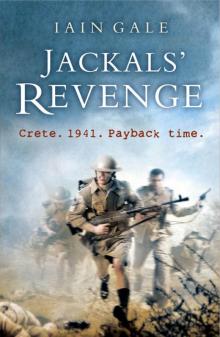 Jackals' Revenge
Jackals' Revenge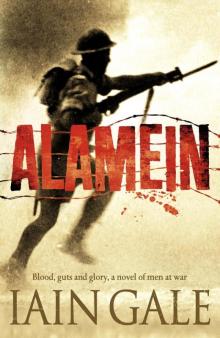 Alamein
Alamein Conspiracy
Conspiracy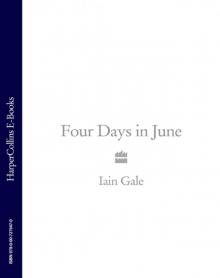 Four Days in June
Four Days in June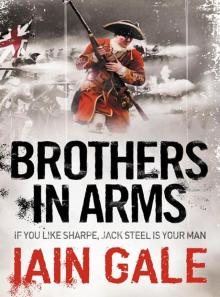 Brothers in Arms (Jack Steel 3)
Brothers in Arms (Jack Steel 3) Brothers in Arms
Brothers in Arms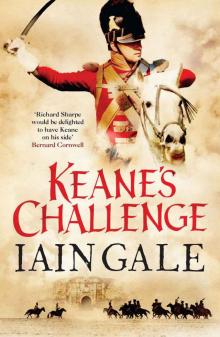 02 - Keane's Challenge
02 - Keane's Challenge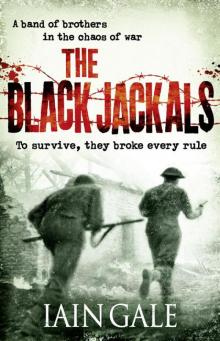 The Black Jackals
The Black Jackals Man of Honour
Man of Honour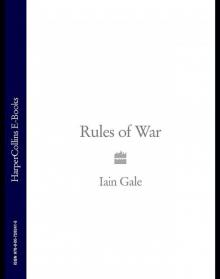 Rules of War
Rules of War